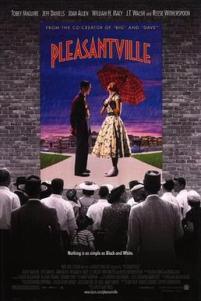
The last time I watched Pleasantville I didn’t have this blog running to discuss it.It was also during the Obama administration where it felt more like nostalgia rather than a documentary.In case you’re not familiar, Pleasantville is a movie about how a nerdy teen, David, and his cool sisterJennifer get sucked into a 1950’s sitcom, “Pleasantville.”They find themselves in black-and-white and in a world as regimented as Stepford, but somewhat more humorously so.As Jennifer is eager to get back home, she introduces this colorless world to sex, and as the two-dimensional characters begin to experience strong emotions colors start to appear.The “picture perfect” Pleasantville begins to let the plastic facade of the 1950s slip to reveal a complex and messy world of true humanity beneath.
Watching the film in the age of Trump, as with most things, interjected a current of fear.The townspeople feel threatened by those who are different, colorful.They want everything just as it was—women serving their husbands, everyone the same hue, and pretending that sexuality doesn’t exist.It may have been originally intended as an homage to the the 1960s, but what became clear in an age of MAGA is that crowds easily respond to suggestions of hatred.Many of those in the group, individually, are “coloreds” themselves, but fear to let it show.Conformity is much safer even if it means hating those who are different.I wasn’t alive in the 1950s, but the superiority of the white man apparently was.One of the characters is, tellingly, named Whitey.
Initially drawn to the film seeking biblical references (occupational hazard) I knew there was an Eden scene before I first watched it.Margaret, on whom David has a crush, has discovered actual fruit at Lover’s Lane.She brings him an apple which, the TV Repairman (if you’re lost, please watch the movie—it’s quite enjoyable) points out, is a form of sin in this world of simple answers and unspoken repression.A mash-up of Jasper Fforde and American Graffiti, the film exposes the lie behind the idea that all were put on earth to serve the white man.Jennifer discovers books and stays behind in colorized Pleasantville to go to college, something of a rarity in those days.Although the movie bombed at the box office, it has a serious message to convey.There was no perfect 1950s iconic America.The process of becoming great is one of evolution, rather than that of a fabled Eden, available only in black-and-white.
